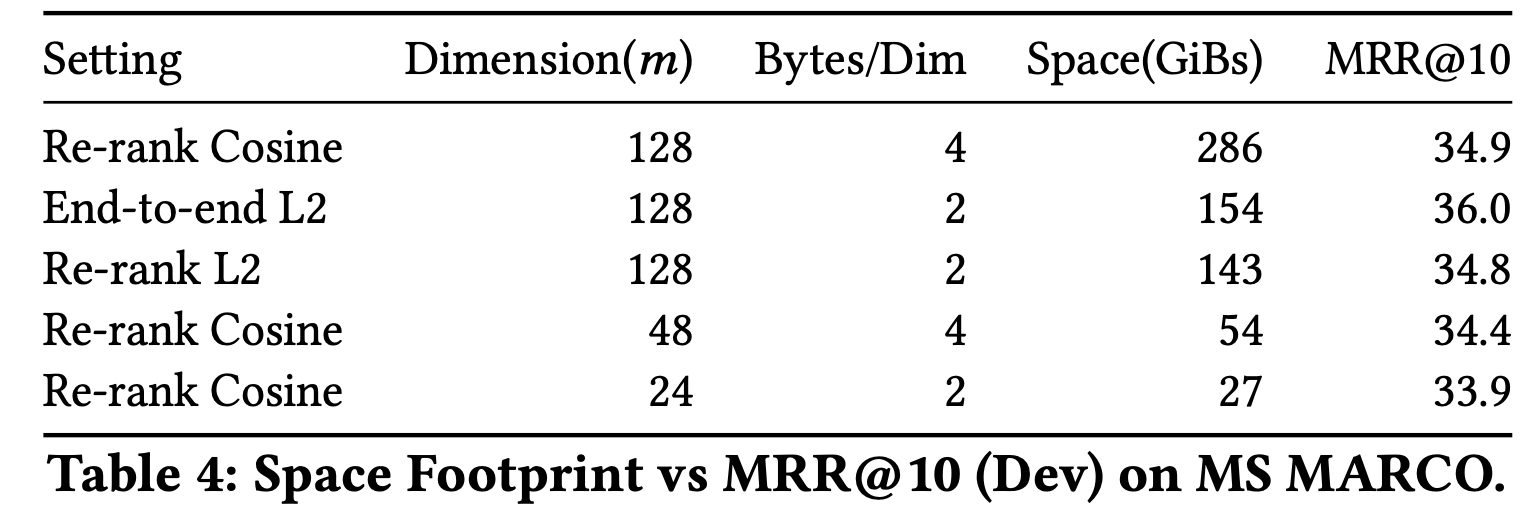[IR] ColBERT: Efficient and Effective Passage Search via Contextualized Late Interaction over BERT
[IR] ColBERT: Efficient and Effective Passage Search via Contextualized Late Interaction over BERT
- paper: https://arxiv.org/pdf/2004.12832
- github: https://github.com/stanford-futuredata/ColBERT
- SIGIR 2020 accepted(인용수: 1071, ‘24-07-13)
- downstream task: Information Retrieval (IR)
1. Motivation
-
IR task에서 Deep Learning 기반 Language Model (LM)의 fine-tuning으로 인해 성능 향상이 되었음
- MRR@10: 7% 향상
- latency: 1,000배 증가 (high-end GPU기준)
-
하지만, 그에 따른 computational cost 증가로 query-document pair기반 수많은 계산을 통해 relevance score 계산이됨
$\to$vector search처럼 offline으로 미리 vectorized하여 속도 향상시킬 수 있는 방법은 없을까? (<100ms)
2. Contribution
-
BERT기반의 효율적인 retrieval을 하는 새로운 ranking model “ColBERT”를 제안함
- query & document를 독립적으로 embedding 후에 late interaction architecture를 통해 cheat & powerful interaction step인 “maxsim”을 수행
- LM의 표현력의 이점과 document representation을 offline으로 pre-compute함으로써 query processing의 속도를 비약적으로 발전시킬 수 있음 $\to$ pruning friendly vector-similarity interaction mechanism
-
IR benchmark에서 speed-accuracy trade-off에서 우수한 curve를 보임
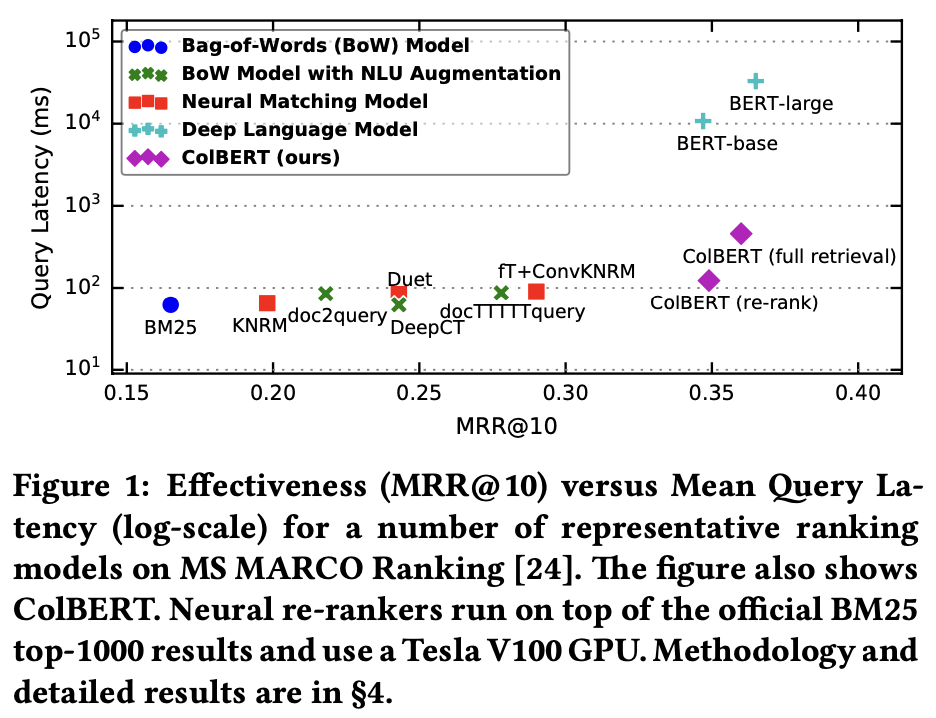
3. ColBERT
-
why ColBERT?
- Contextualized Late interaction over BERT

(a) representation-focused rankers: Query & Document를 독립적으로 embedding하고, 마지막 vector간의 similarity를 통해 relavance score 계산
$\to$ document를 offline으로 pre-compute 가능 (속도 향상)
(b) interaction-focused rankers: word-level & phrase-level interaction을 통해 similarity score를 도출
(c) 더 powerful한 interaction-focused rankers: word-within + across q & d interaction 수행
$\to$ (b), (c)는 (a)에 비해 성능이 우수하나 속도가 느림
(d) (a)처럼 query & document간에 representation을 독립적으로 LM기반으로 embedding 후, late interaction인 maximum similarity를 통해 vector-search 가능해짐
-
Architecture
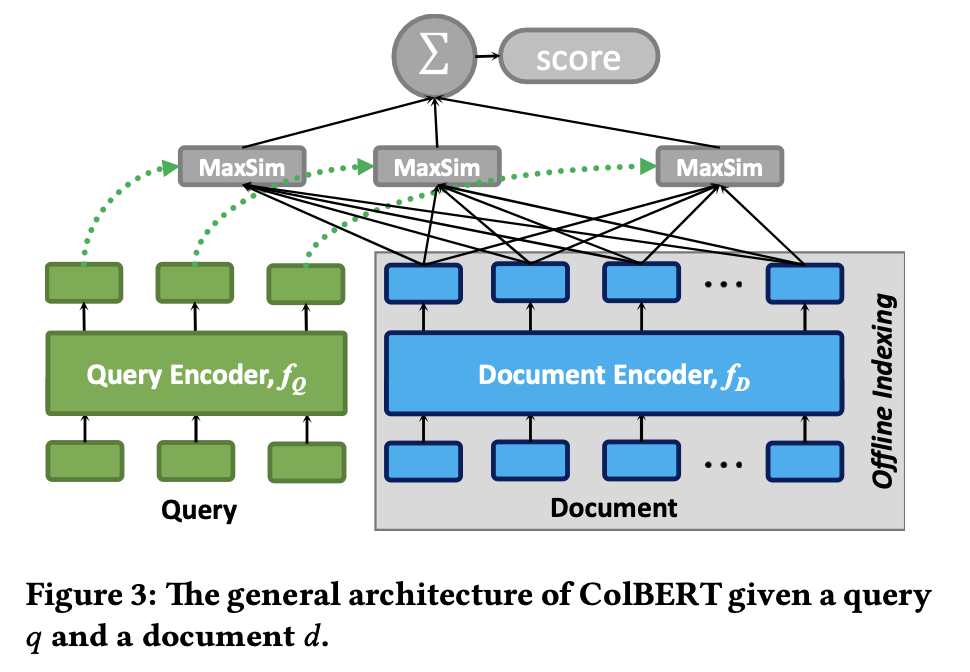
-
query encoder
- BERT based WordPiece로 tokenize 수행 (mask token (#)로 padding)
- Activation 없는 Linear Layer 통과 (dimension 맞추는 기능: m)
- L2 normalization $\to$ [-1, 1]

-
document encoder (offline)
- query encoder와 동일하나, document token [D]를 [CLS] token 뒤에 사용
- punctuation (comma, mark, etc) 제거하는 filter 통과 (해당 token은 무의미하다는 가정)

- Offline Indexing으로 Document Embeddings을 미리 계산해서 저장해둠
-
late interaction mechanism
- trainable parameter-free
- $<q, d^+, d^->$ pair를 통해 pair-wise softmax cross-entropy loss로 학습
- $d^+$: positive document
- $d^-$: negative document

- $S_{q,d}$: q query와 d document간의 relavance score
-
-
End-to-end Top-k Retrieval with ColBERT
- 매우 큰 collection에서 end-to-end retrieval을 수행하여 recall을 높이는게 목적
- Top-k 개의 document을 retrieval (k « N)
- Pruning friendly operator “MaxSim” 사용
- 2-stage로 retrieavl 수행
- query당 $k’=k/2$개의 top-$k’$ result 도출 $\to$ query당 *$N_q$개의 embedding vector를 도출하므로 $N_q \times k’$개 도출 $\to$ k개의 unique document 도출
- IVFPQ(inverted file with product quantization) indexing으로 quanitzation 하여 vector-indexing수행
- k개의 result 중 reranking을 수행
- query당 $k’=k/2$개의 top-$k’$ result 도출 $\to$ query당 *$N_q$개의 embedding vector를 도출하므로 $N_q \times k’$개 도출 $\to$ k개의 unique document 도출
4. Experiments
- Dataset
- MS MARCO Ranking: 8.8M web page를 Bing에서 1M queries로 취득
- TREC Complex Answer Retrieval (TREC-CAR) : Wikipidia에 기반한 29M passage의 synthetic dataset
- Model
- pretrained BERT
- $N_q$=32
-
Result
-
MSMARCO
- Re-ranking

- End-to-end

-
TREC CAR
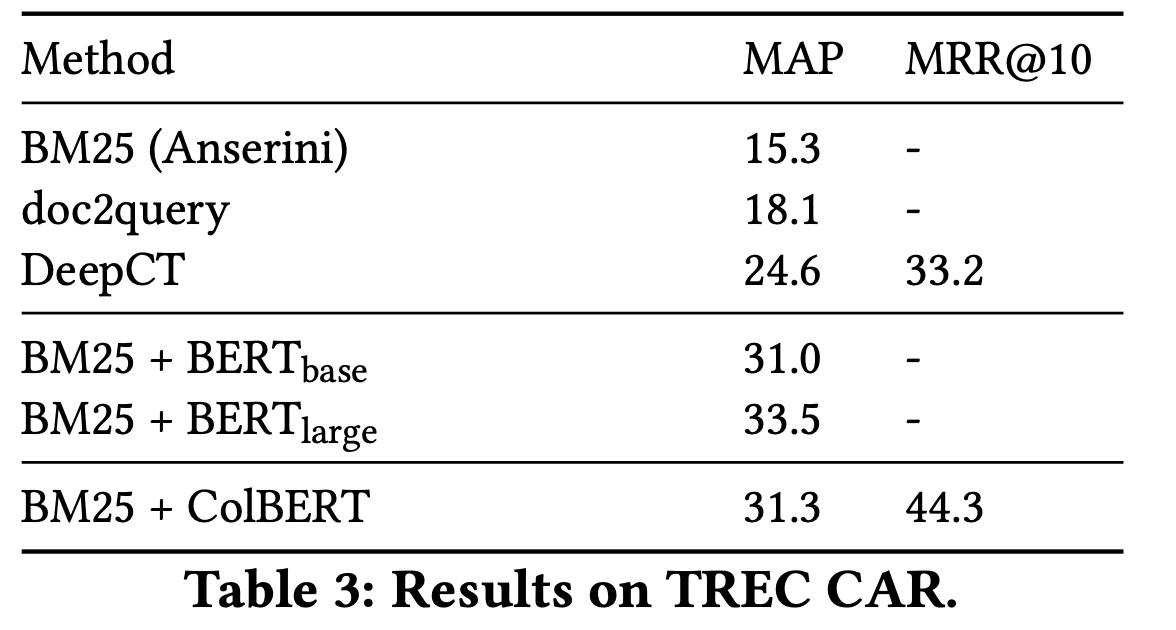
-
-
Speed-Accuracy tradeoff vs. BERT
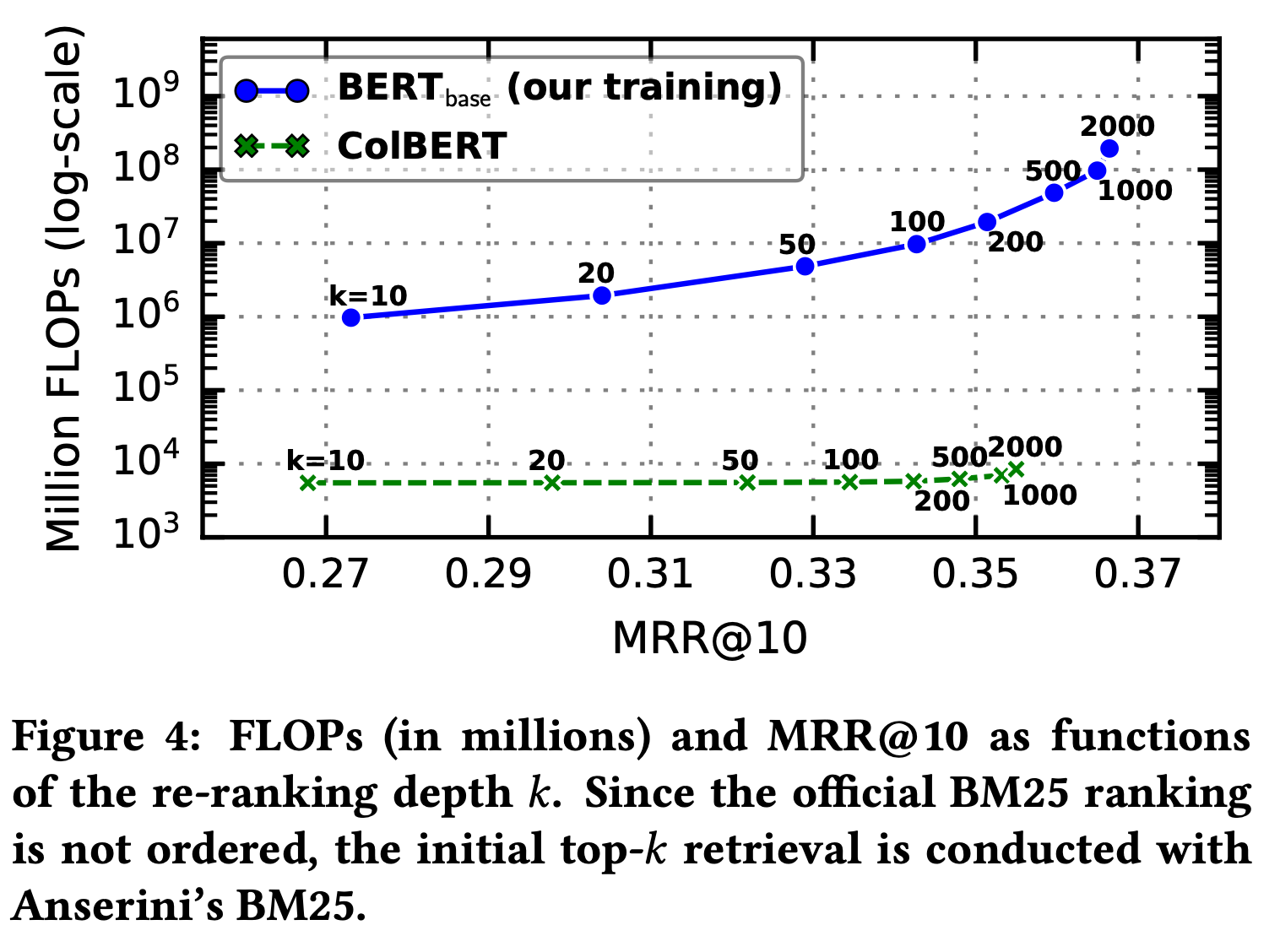
-
Ablation Studies
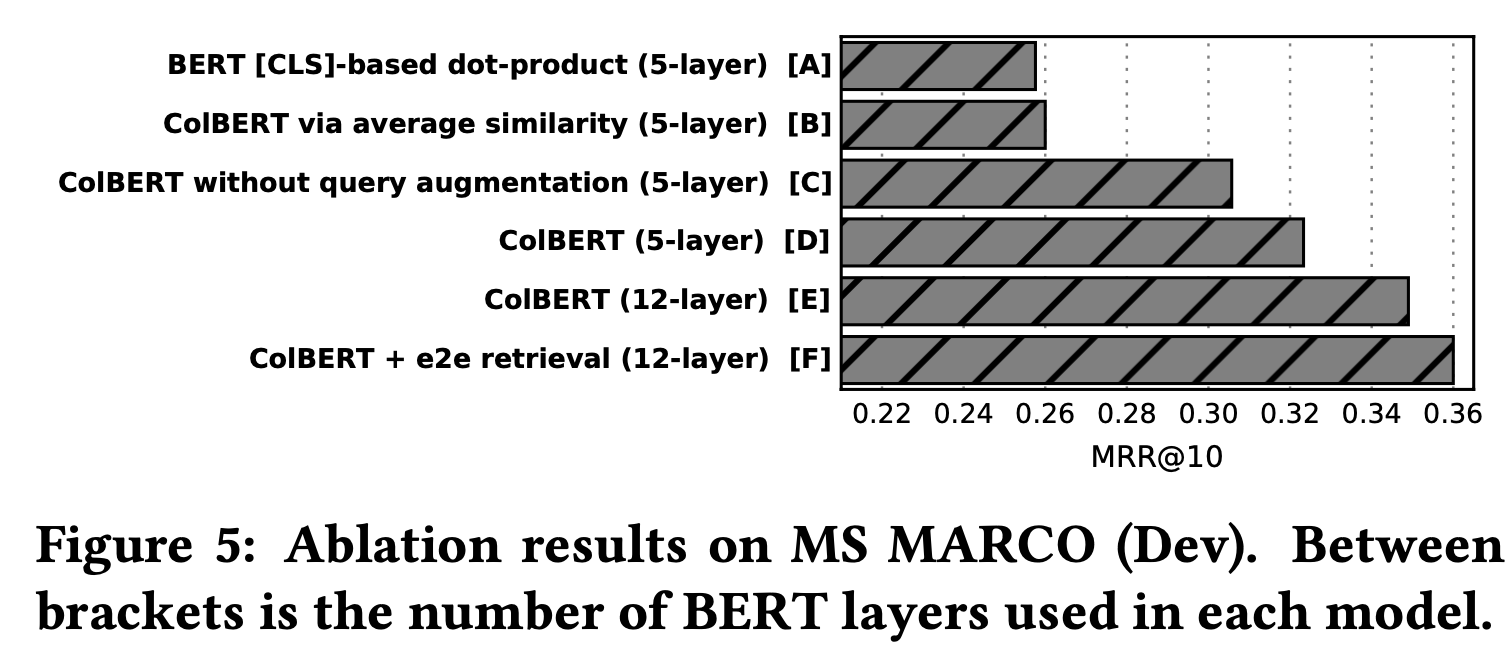
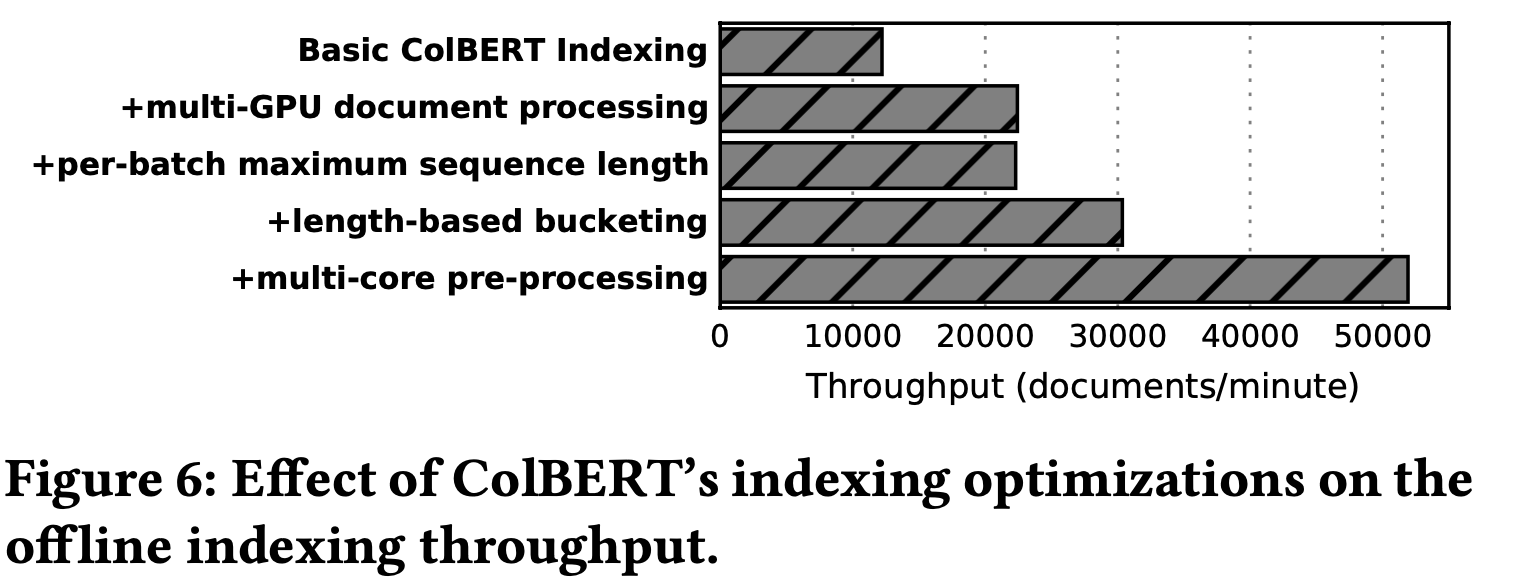
-
Indexing Through-put
